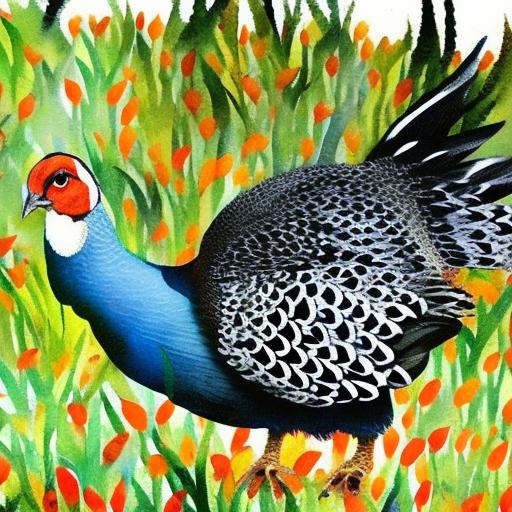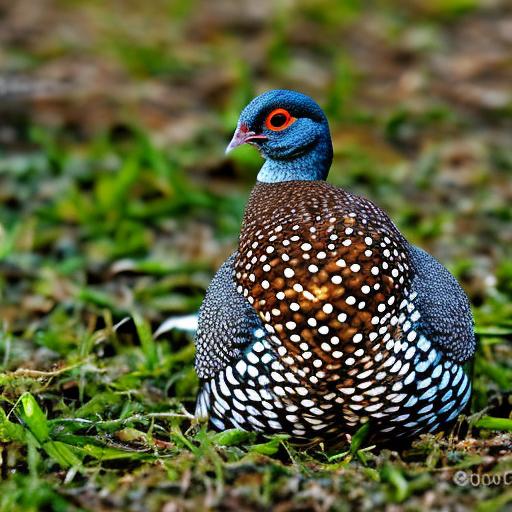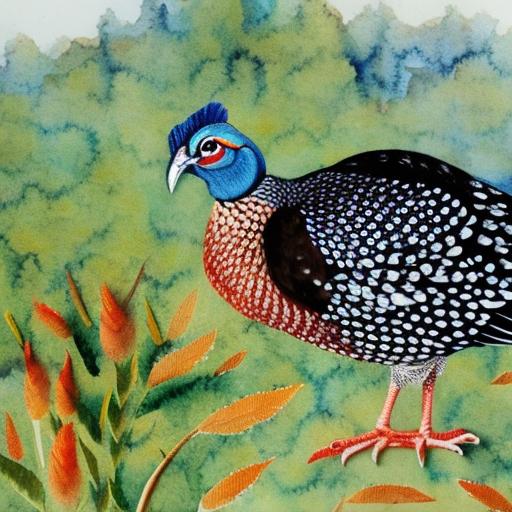Guinea fowl breeding is a rewarding and profitable venture for many farmers and homesteaders. Guinea fowl are native to Africa and have been domesticated for centuries. They are known for their unique appearance, with speckled feathers and a helmet-like crest on their heads. Guinea fowl are also valued for their ability to control pests such as ticks, flies, and other insects, making them a valuable addition to any farm or homestead.
Guinea fowl are relatively low-maintenance birds, making them an attractive option for those looking to add poultry to their operation. They are hardy and adaptable, able to thrive in a variety of climates and conditions. Guinea fowl are also known for their loud and distinctive calls, which can serve as a natural alarm system, alerting farmers to potential threats or predators. Overall, guinea fowl breeding can be a profitable and enjoyable endeavor for those looking to diversify their farm or homestead.
Key Takeaways
- Guinea fowl breeding is a rewarding venture that can provide a sustainable source of income and food.
- Breeding guinea fowl can help control pests and insects in the environment, making them beneficial for agriculture.
- Selecting the right breeding stock is crucial for successful guinea fowl breeding and requires careful consideration of traits such as health, temperament, and productivity.
- Proper housing and care are essential for the well-being and productivity of guinea fowl breeders, including providing adequate space, protection from predators, and a balanced diet.
- The breeding and incubation process for guinea fowl involves natural mating or artificial insemination, followed by careful incubation and hatching of the eggs.
Benefits of Guinea Fowl Breeding
There are numerous benefits to breeding guinea fowl, making them a valuable addition to any farm or homestead. One of the primary benefits of guinea fowl breeding is their pest control abilities. Guinea fowl are voracious insect eaters, consuming large quantities of ticks, flies, and other pests. This can help reduce the need for chemical pesticides and control the spread of diseases carried by insects. Additionally, guinea fowl can help protect gardens and crops from pest damage, making them a valuable asset for farmers and gardeners.
In addition to their pest control abilities, guinea fowl are also valued for their meat and eggs. Guinea fowl meat is lean and flavorful, with a taste similar to chicken but slightly richer. Their eggs are also prized for their rich flavor and high nutritional content. This makes guinea fowl products a valuable commodity for those looking to sell meat and eggs at local markets or directly to consumers. Overall, the benefits of guinea fowl breeding include pest control, meat and egg production, and the potential for additional income through sales of guinea fowl products.
Selecting the Right Breeding Stock
Selecting the right breeding stock is crucial for successful guinea fowl breeding. When choosing breeding stock, it’s important to select birds that are healthy, well-maintained, and free from genetic defects. Look for birds that are active, alert, and have good body condition. Avoid birds that appear lethargic, have disheveled feathers, or show signs of illness or injury.
It’s also important to consider the genetic diversity of the breeding stock. Inbreeding can lead to genetic defects and health problems in offspring, so it’s important to select breeding stock from different bloodlines to maintain genetic diversity within the flock. When selecting breeding stock, consider traits such as size, coloration, and temperament to ensure that the offspring will meet your specific breeding goals.
Finally, consider the age of the breeding stock. Guinea fowl reach sexual maturity at around six months of age, so it’s important to select birds that are old enough to breed. Avoid breeding birds that are too young or too old, as this can lead to fertility issues and other reproductive problems. By carefully selecting the right breeding stock, you can ensure the success of your guinea fowl breeding program and produce healthy offspring with desirable traits.
Housing and Care for Guinea Fowl Breeders
Proper housing and care are essential for maintaining healthy guinea fowl breeders. When it comes to housing, guinea fowl require a secure coop or shelter to protect them from predators and the elements. The coop should provide adequate space for the birds to roost and nest, as well as protection from extreme temperatures and inclement weather. It’s also important to provide access to fresh water and a balanced diet to ensure the health and well-being of the breeders.
Guinea fowl are social birds and should be kept in groups to prevent stress and aggression. Provide ample space for the birds to move around and engage in natural behaviors such as dust bathing and foraging. Additionally, it’s important to regularly clean the coop and provide fresh bedding to maintain a clean and healthy living environment for the breeders.
In terms of care, guinea fowl require regular monitoring for signs of illness or injury. It’s important to handle the birds gently and observe their behavior to identify any potential health issues. Provide regular veterinary care and vaccinations as needed to prevent disease and maintain the overall health of the breeders. By providing proper housing and care for guinea fowl breeders, you can ensure their well-being and productivity in your breeding program.
Breeding and Incubation Process
The breeding and incubation process is a crucial aspect of guinea fowl breeding. Guinea fowl are seasonal breeders, typically mating in the spring and early summer months. To encourage successful breeding, provide a balanced diet and ample space for the birds to engage in courtship behaviors. Monitor the birds closely for signs of mating behavior, such as males displaying their feathers and vocalizing to attract females.
Once mating has occurred, collect the eggs regularly to prevent them from being damaged or eaten by predators. Guinea fowl eggs should be stored in a cool, dry place with consistent temperature and humidity levels until they are ready for incubation. When it comes time to incubate the eggs, use a reliable incubator with accurate temperature and humidity controls to ensure successful hatching.
During the incubation process, monitor the eggs closely for signs of development and adjust the temperature and humidity levels as needed. After approximately 26-28 days, the eggs should begin to hatch, producing healthy guinea fowl chicks. Provide proper care and nutrition for the chicks as they grow, ensuring that they have access to water, feed, and a safe environment to thrive. By following a careful breeding and incubation process, you can successfully produce healthy guinea fowl offspring for your breeding program.
Health and Disease Management in Guinea Fowl Breeding

Maintaining the health of your guinea fowl breeders is essential for a successful breeding program. Regular health checks are important to monitor for signs of illness or injury in the birds. Look for symptoms such as lethargy, loss of appetite, abnormal droppings, or respiratory issues, which may indicate underlying health problems. Provide regular vaccinations and deworming treatments as recommended by a veterinarian to prevent common diseases and parasites.
It’s also important to maintain a clean living environment for the breeders to prevent the spread of disease. Regularly clean the coop or shelter, provide fresh bedding, and ensure access to clean water and a balanced diet. Additionally, practice good biosecurity measures to prevent the introduction of diseases from outside sources, such as wild birds or other livestock.
In the event of an outbreak of disease, it’s important to isolate affected birds and seek veterinary care immediately. Implement quarantine measures to prevent the spread of illness within the flock and follow recommended treatment protocols to restore the health of the affected birds. By maintaining a proactive approach to health and disease management, you can ensure the overall well-being of your guinea fowl breeders and minimize the impact of potential health issues on your breeding program.
Marketing and Selling Guinea Fowl Products
Once you have successfully bred guinea fowl and produced meat and eggs, it’s important to consider marketing and selling your products. There is a growing demand for guinea fowl products due to their unique flavor and nutritional benefits. Consider selling your products at local farmers’ markets, directly to consumers through a farm stand or online store, or supplying restaurants and specialty food stores in your area.
When marketing guinea fowl products, emphasize their natural pest control abilities, lean meat, rich flavor, and high nutritional content. Highlight the benefits of consuming guinea fowl products over conventional poultry options such as chicken or turkey. Consider offering value-added products such as smoked or cured meats, specialty egg products, or ready-to-cook meal options to attract a wider customer base.
Building relationships with local chefs, retailers, and consumers can help increase awareness of your guinea fowl products and generate repeat business. Consider offering tastings or cooking demonstrations to showcase the versatility of guinea fowl products and educate consumers about their unique qualities. By effectively marketing and selling your guinea fowl products, you can capitalize on the growing demand for specialty poultry products and generate additional income from your breeding program.
In conclusion, guinea fowl breeding offers numerous benefits including pest control, meat and egg production, and potential income from selling guinea fowl products. Selecting the right breeding stock is crucial for successful breeding programs while providing proper housing and care is essential for maintaining healthy breeders. The breeding and incubation process requires careful monitoring and attention to detail while proactive health management is necessary to prevent disease outbreaks within the flock. Finally, effective marketing strategies can help you capitalize on the growing demand for guinea fowl products and generate additional income from your breeding program. With careful planning and management, guinea fowl breeding can be a rewarding venture for farmers and homesteaders looking to diversify their operations while providing high-quality poultry products to consumers.
If you’re interested in learning more about guinea fowl breeding, you may also want to check out this informative article on creating the perfect garden chicken coop on PoultryWizard.com. This article provides valuable insights into designing a coop that is both functional and aesthetically pleasing, ensuring the well-being of your guinea fowl and other poultry. You can find the article here.
FAQs
What is guinea fowl breeding?
Guinea fowl breeding refers to the process of raising and breeding guinea fowl for various purposes such as meat, eggs, pest control, and ornamental purposes.
What are the benefits of guinea fowl breeding?
Guinea fowl breeding can provide a sustainable source of meat and eggs, as well as natural pest control for farms and gardens. Additionally, guinea fowl are known for their unique and attractive appearance, making them popular for ornamental purposes.
What are the basic requirements for guinea fowl breeding?
Basic requirements for guinea fowl breeding include suitable housing, access to clean water, proper nutrition, and protection from predators. Additionally, breeding guinea fowl requires a male and female pair for successful reproduction.
What are some common challenges in guinea fowl breeding?
Common challenges in guinea fowl breeding include predation, disease, and proper management of breeding pairs. Additionally, ensuring proper incubation and hatching of eggs can be a challenge for breeders.
Are there any specific considerations for breeding guinea fowl?
When breeding guinea fowl, it is important to provide adequate space for the birds to roam and forage. Additionally, ensuring a balanced diet and proper nesting areas for egg laying are important considerations for successful breeding.
Where can I find more information on guinea fowl breeding?
More information on guinea fowl breeding can be found in resources such as books, online forums, and agricultural extension services. Additionally, experienced breeders and farmers can provide valuable insights and advice on guinea fowl breeding.
Meet Walter, the feathered-friend fanatic of Florida! Nestled in the sunshine state, Walter struts through life with his feathered companions, clucking his way to happiness. With a coop that’s fancier than a five-star hotel, he’s the Don Juan of the chicken world. When he’s not teaching his hens to do the cha-cha, you’ll find him in a heated debate with his prized rooster, Sir Clucks-a-Lot. Walter’s poultry passion is no yolk; he’s the sunny-side-up guy you never knew you needed in your flock of friends!







